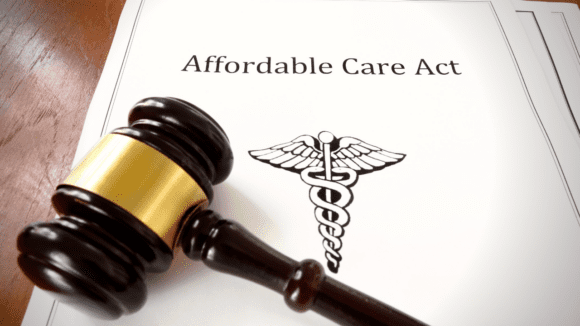Georgia Access and Health Care Exchange 1332 Exemptions

This post is part of a series sponsored by AgentSync.
Georgia is contesting a federal challenge to its 1332 waiver, leaving the 2023 healthcare open enrollment period in flux while the state and fed duke it out.
If some of that sounds a little garbled, then have no fear: We’re here with the basics of what we’re talking about, what the heck a 1332 waiver even is, and how we got to this point.
To begin with, let’s do a quick refresher of the Affordable Care Act (ACA) and set the stage for this healthcare drama.
The Affordable Care Act and state health exchanges
Circa 2010, Congress voted the Affordable Care Act (ACA) into law, which created a federal exchange, a one-stop shop of ACA-compliant plans that would follow federal guidelines for minimum healthcare coverage.
The law, also known as “Obamacare,” gave states the option to start their own healthcare exchanges with ACA-compliant, locally covered plans. Any state that chose not to start a state-specific health exchange allowed the federal exchange to be a default for non-employer-based individual coverage.
ACA infrastructure also set up a system of credits and state rebates to help keep costs low for consumers and the federal government. Some of the credits go to subsidizing coverage for those with low incomes, and some of them can be rebated to states that find ways to lessen the overall cost of insuring people.
What is a Section 1332 healthcare waiver?
A Section 1332 healthcare waiver allows states to be exempt from some of the Affordable Care Act guidelines – but not all – and use federal rebates for “innovative” strategies to reduce the cost of healthcare. The majority of states that have applied for 1332 waivers have used them for reinsurance programs that pass on insurance risks and provide backup to health insurers.
The general qualifications of a 1332 waiver are fourfold:
Any coverage the state provides under a 1332 must be as comprehensive as ACA coverage
Coverage must be as affordable as ACA-equivalent coverage
The same(ish) number of state residents should be covered as an ACA plan
The 1332 exemption can’t increase the federal deficit
Aside from using this provision to start state-based reinsurance, Washington state has applied for an innovation waiver to extend ACA-compliant coverage (notably without federal subsidies) to its undocumented populace.
Georgia’s 1332 waiver
Georgia applied for a waiver in July 2020, aimed at reforming its market in time for the 2023 open enrollment season. The plan comprises two essential parts:

In late 2020, the presidential administration of Donald J. Trump approved Georgia’s Section 1332 State Innovation Waiver, in part based on Georgia’s self-reported data that the state would see increased insurance enrollment as a result of withdrawing from the federal exchange.
Even at the time, Georgia’s waiver request was controversial, with many critics saying that the lack of state budget for advertising the private Georgia Access Model would actually have the opposite effect on insurance enrollment.
Georgia’s waiver in jeopardy – federal criticism
Federal-level criticism of Georgia’s waiver application has only grown since 2020. Commentary from the Brookings Institute and the Center on Budget and Policy Priorities leveled severe critiques on the state of Georgia’s initial data submission, and in fact called for an outright rejection of the waiver. Soon after the 2020 election, the administration under President Joseph R(obinette) Biden indicated it would terminate the waiver after the fact, due to the inconsistencies in the state’s assessment of the Georgia Access Model’s impact.
In April of 2022, the Department of Health and Human Services and Department of the Treasury sent a joint letter to the state of Georgia, requesting updated impact data by July 28, 2022, or the departments would suspend the state’s 1332 waiver. On July 27, 2022, the state responded by challenging the departments’ abilities to request data for a program that hasn’t yet reached implementation.
This looks like a case that won’t have an easy resolution, as the federal government’s ability to … well … govern has been called into question by the U.S. Supreme Court. While we here at the AgentSync blog aren’t conlaw nerds, just insurance ones, we’ll certainly be keeping an eye on Georgia Access as the back-and-forth between federal agencies and Georgia state officials continues.

New Georgia insurance license pulled back
Georgia initially planned for the success of their waiver as the state announced the creation of an “Agent – Georgia Access” health insurance license in late July. The license, which would have gone into effect Aug. 12, 2022, would allow agents to sell Georgia Access plans.
To obtain the new license, applicants would need to hold an accident and sickness line of authority (or apply for one simultaneously to their Georgia Access application). Residents and non-residents alike would need to pass an exam in addition to holding an accident and sickness line in order to be fully licensed as Georgia Access agents.
However, Georgia quickly pulled back its electronic availability of the “Agent – Georgia Access” license, possibly signaling the state expected federal pushback once again.
In the absence of settled answers, those who hope to sell health insurance via the Georgia Access Model will need to at least apply for health licenses in Georgia and then sit tight to see if things get sorted in time for the 2023 open enrollment season.
If nothing else, this serves as a fine example of the difficulties of staying compliant with shifting regulations across all states, territories, and the federal government. To make it easier, check out AgentSync’s solutions to stay on top of your producer licenses.
Topics
Georgia
The most important insurance news,in your inbox every business day.
Get the insurance industry’s trusted newsletter





